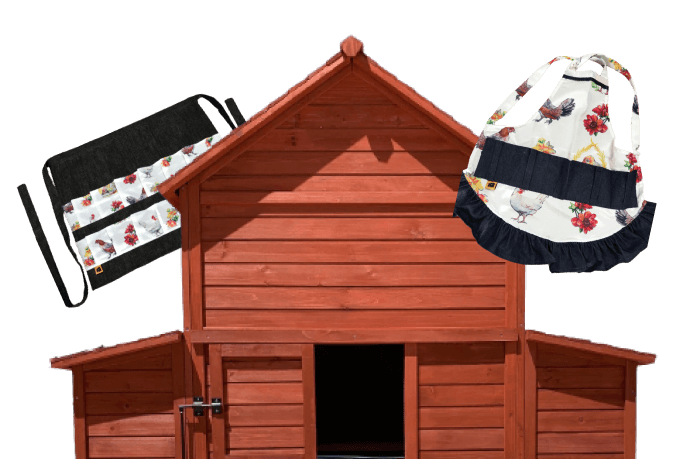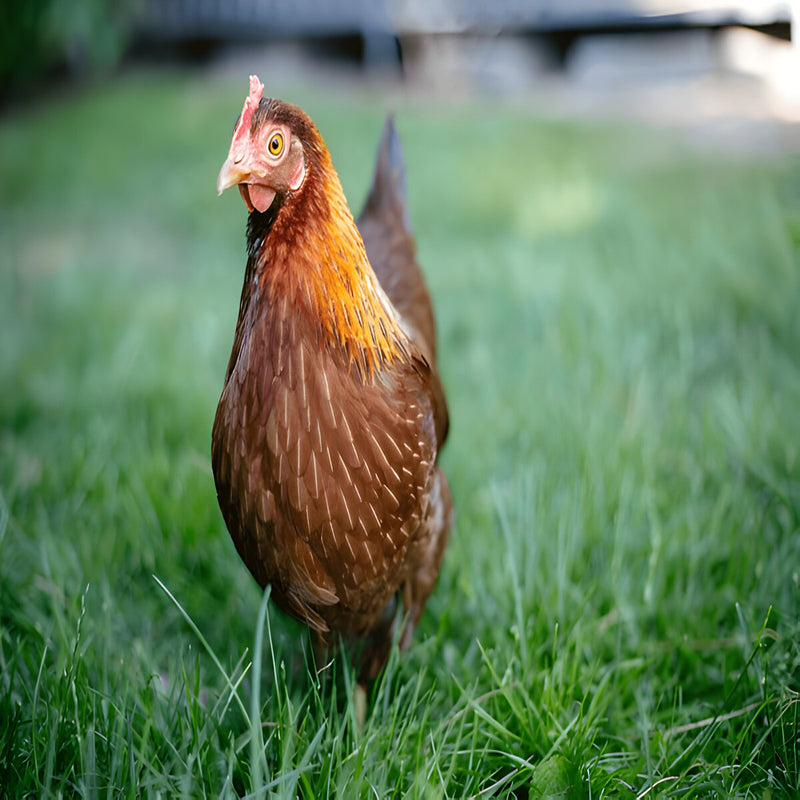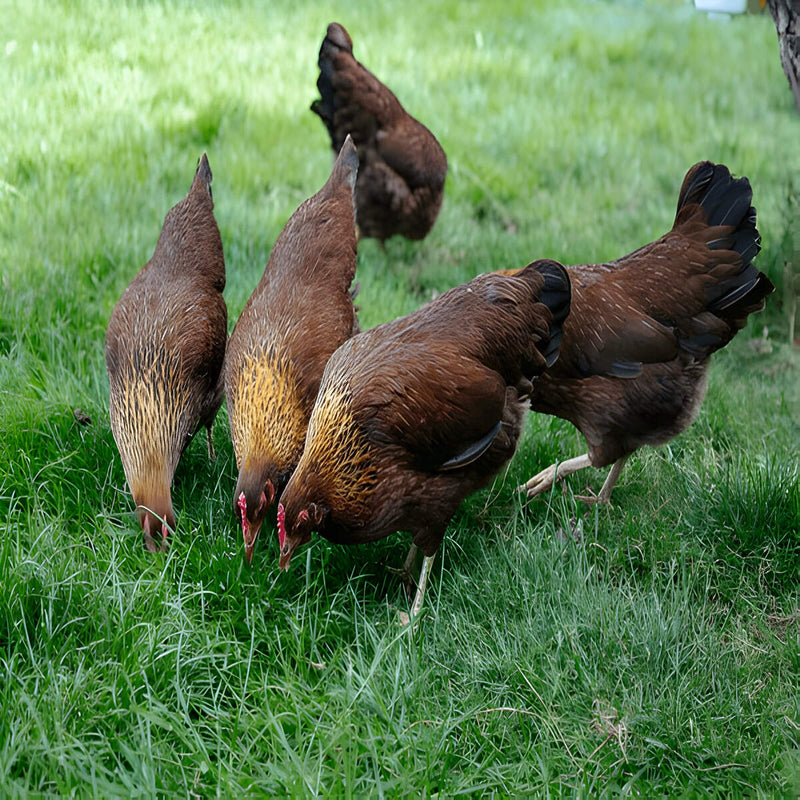-
Egg Size
Medium
-
Egg Quantity
Very Good (4/wk)
-
Egg Color
Chocolate
-
Cold Tolerance
Hardy In Winter
-
Abundance
Common
-
Personality
Friendly
-
Size
Large Fowl
-
Feathered Feet
No
-
Heat Tolerance
Tolerates Heat Well
Welsummer Chicken
Welsummer Chicken
The Welsummer chicken is known for its beautiful brown and red feathers, high egg production, and resilience in cold climates. With a friendly and easygoing nature, it’s a favorite for backyard flocks.
Originating from Welsum, Holland, the Welsummer was first brought to the U.S. in 1928 and gained popularity for its dark brown eggs. Officially recognized by the American Poultry Association in 1991, it has become a beloved breed among small-scale farmers.
Welsummers are intelligent and adaptable, thriving in both free-range environments and runs. The breed features single combs, medium wattles, almond-shaped ear lobes, and a strong, short beak. Roosters weigh 7-8 lbs, and hens 5-6 lbs.
Health and Care:
-
Hardy and Robust: Welsummers are generally healthy and hardy chickens. They adapt well to both hot and cold climates, making them suitable for a variety of environments. However, like many chickens, they should be kept in a well-ventilated coop, especially in the winter, to prevent respiratory issues.
-
Low Maintenance: They are low-maintenance in terms of care. Regular cleaning of the coop, access to fresh water, and a balanced diet are sufficient for maintaining their health. They are generally disease-resistant, but, as with all chickens, it's important to monitor for common issues like mites and lice.
- Good foragers: Welsummers are active foragers and do well in free-range environments. Allowing them access to outdoor spaces will help keep them healthy, as they enjoy scratching the ground and hunting for insects and seeds.

Egg Laying:
-
High Egg Production: Welsummers are excellent layers, producing around 200-250 eggs per year. Their eggs are typically medium to large in size and have a distinctive dark brown or terracotta color, often speckled with darker spots.
- Consistent Layers: They tend to lay year-round, with their peak production occurring in the spring and summer months. However, like most chickens, egg production can decrease in the winter, especially if natural light is limited. Providing supplemental lighting can help maintain production during the darker months.
Temperament:
-
Friendly and Calm: Welsummer chickens are known for their friendly and calm temperament. They are generally not aggressive, making them suitable for families with children or mixed-species flocks.
-
Curious and Active: They are curious birds that enjoy exploring their surroundings, especially if they have access to a free-range area. Welsummers are quite intelligent, and their curiosity can sometimes make them wander a bit further than expected, so it's a good idea to provide a secure enclosure if you want to keep them contained.
- Moderately Sociable: While they are social and enjoy the company of other chickens, Welsummers can also be a bit independent at times. They are not usually prone to bullying other chickens, and they fit well in mixed-flock settings.
Frequently Asked Questions:
Are Welsummer hens reliable egg layers?
Yes, Welsummer hens are excellent layers, typically producing around 4 eggs per week, amounting to about 150-200 eggs annually. It's important to note that the color of their eggs can vary, with the eggs becoming lighter as the hens lay more frequently and darkening again after they take a break, such as during a molt.
Do Welsummer chickens tend to be noisy?
Welsummer chickens can indeed be quite vocal! They generally hold a middle rank in the pecking order and aren’t overly dominant. However, they enjoy chatting and can sometimes be loud, whether they're just being talkative, celebrating after laying an egg, or sounding an alarm about potential threats. Their lively chatter can occasionally be a bit much for close neighbors.
Is the Welsummer breed considered rare?
Yes, Welsummer chickens are considered a rare breed, originally hailing from Holland. They are a robust and versatile breed that thrives in various environments. Welsummers are also superb foragers, laying 3-5 eggs per week, with eggs that vary from reddish-brown to a rich mahogany, often speckled with brown spots.
How many eggs do Welsummers typically produce?
Welsummer hens are decent layers, averaging around 160 eggs per year. The color of their eggs is particularly striking, with a deep brown hue that’s quite distinctive. Interestingly, the pigment on the eggs can even be rubbed off by hand.
Are Welsummer hens good mothers?
Welsummer hens do tend to go broody, especially in the spring, making it a good time to have them hatch eggs. However, they aren’t known for being the most attentive mothers, as they can sometimes be a bit careless with their chicks.
What’s the temperament of Welsummer roosters?
Welsummer roosters are generally friendly and calm, especially if they are handled regularly as they grow. They make excellent flock guardians due to their natural alertness and awareness of their surroundings. Additionally, they are good foragers and maintain a docile demeanor.
Welsummer Chicken Facts
- Poultry Show Class: Continental Class
- Weights: Hen —-6 lbs
- Rooster—-7 lb
- Pullet—-5 lbs
- Cockerel—6 lbs
- Purpose and Type: Dark Egg Laying; Production
- Egg Shell Color: Dark Brown Egg
- Egg Production: 200-280 eggs per year (estimates only)
- Egg Size: Medium-Large
- Temperament: Active
- Gender Accuracy: 85-90%
- Fertility Percentage: 60-75%
- Broody: Variable
- Mating Ratio: 9 Females to 1 Male
- Roost Height: 2 to 4 feet
- Country of Origin: Holland
- APA: Yes, Recognized by the Standard of Perfection in 1991.
- TLC: Not Listed
- Breeder Farm Source: Poultry Breeding Farm has been developing our bloodline/strain of pure Welsummer since 1998.
Notice: We do not sell items on Amazon or other websites.






